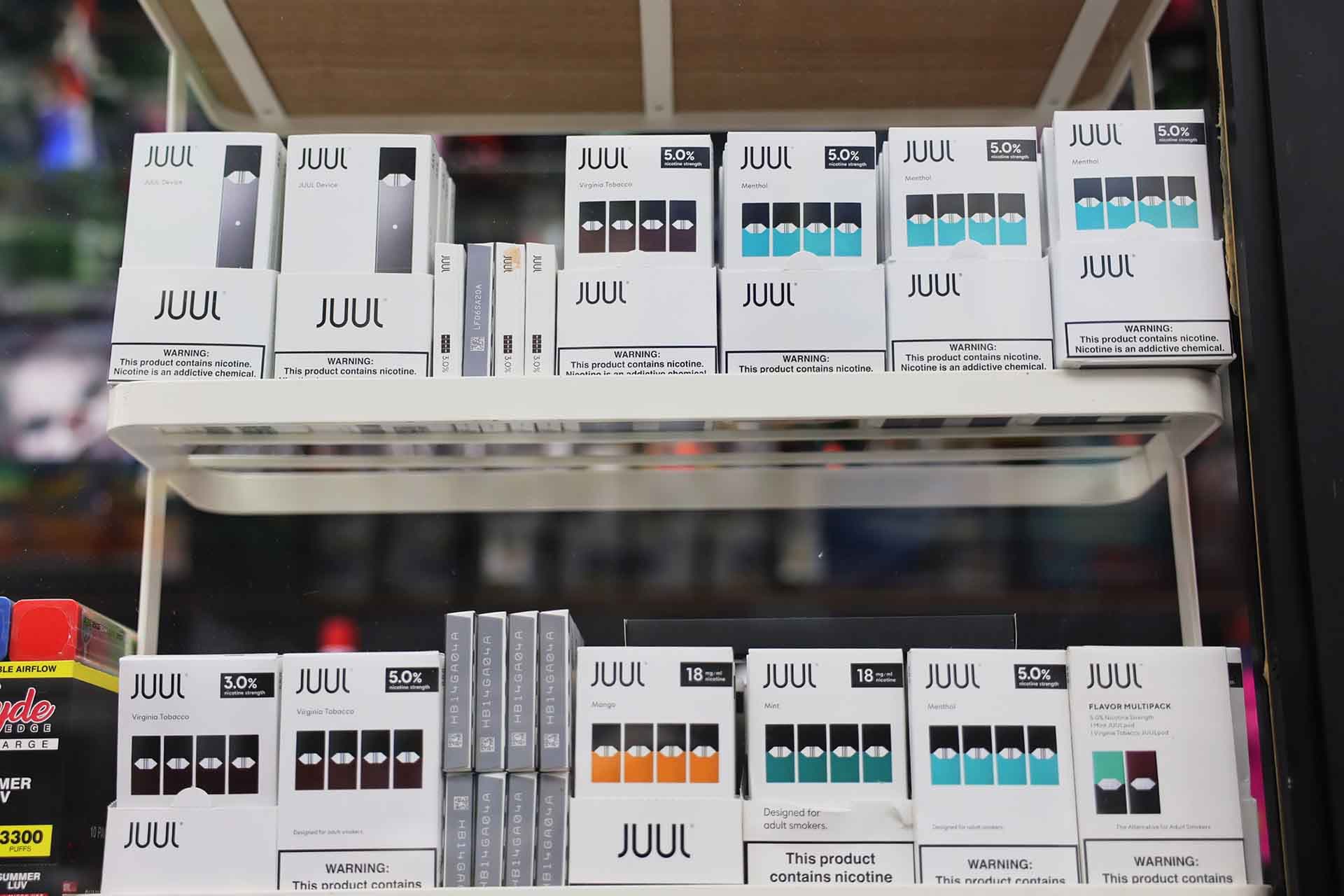This story was produced in collaboration with The Times.
A British public health official responsible for vaping policy dined with e-cigarette maker Juul and advised the company on how to launch its products in the U.K., internal Juul documents show.
Martin Dockrell, England’s tobacco control programme lead, had a private dinner with Juul co-founder Adam Bowen and two other company representatives at a nicotine conference in Warsaw, Poland, in June 2017 — a time when Juul products were driving a youth vaping epidemic in the U.S.
The government agency Public Health England did not keep a record of the dinner, which was described as “excellent” by a Juul representative who attended, but details of it emerged in a tranche of documents released as part of a multimillion-dollar settlement between Juul and the U.S. state of North Carolina.
Juul was sued by North Carolina over youth marketing allegations, including launching its devices with brightly-coloured advertisements and young-looking models — and without warnings that the vapes contain nicotine.
News of the dinner, which was also attended by Deborah Arnott, CEO of Britain’s leading anti-smoking charity Action Against Smoking and Health, has been revealed by The Examination and the Times at a time when Dockrell just shaped a new bill on vaping that was introduced to the British Parliament on Wednesday this week.
The bill aims to regulate the displays, packaging and flavors of e-cigarettes to prevent the marketing of vaping to young people.
The number of children using e-cigarettes in Britain has tripled in the last three years, according to the U.K. Department of Health and Social Care, with disposable vape Elf Bar now the most popular device among teenagers.
Doctors and public health experts have said the U.K.’s approach of promoting e-cigarettes as a safer alternative to smoking, a stance which Dockrell has been influential in shaping, has contributed to the surge in youth vaping among British teenagers.
Martin McKee, a professor of European public health at the London School of Hygiene & Tropical Medicine, criticized Dockrell and Arnott for attending the dinner.
“It was entirely inappropriate even to meet with representatives of a company producing an addictive product widely used by children, much less to advise on it,” he said.
“It is even worse that we are only learning about it now."
Dockrell did not wish to comment but the Department of Health said he did not provide any advice to Juul or set out information that was not publicly available. The agency also said that similar increases in youth vaping have been seen in Australia, Canada and the U.S., all of which have differing approaches to vape regulation.
Juul did not answer The Examination's questions.
Juul considered Dockrell a key ally
An internal email from a senior Juul official who attended the dinner meeting claims Dockrell said Public Health England would be “very supportive” of launching Juul in the U.K. and highlighted how “no pre-approval” was necessary if Juul was launched as a “novel tobacco product” rather than as an e-cigarette.
The email concluded that Juul had not previously considered launching through the faster route and described it as “a very attractive approach to the U.K. market.”
It is just one of a number of communications that Juul representatives appear to have had with Dockrell. Another email from a few months later states that Dockrell was due to meet a Juul consultant for a beer.
Subscribe to our newsletter
Global health reporting, straight to your inbox
In an email sent on Oct. 11, 2017, the Juul consultant emailed company executives and said, “Martin will be in Brussels for an event next week and we’re going for a beer afterwards. If you have anything you want me to ask now’s the time to get your requests in.”
The same consultant described Dockrell as “the man on the ground for tobacco control at PHE [Public Health England] and strongly pro e-cigarette” in a 2018 document entitled “stakeholder mapping.”
The document also claimed Dockrell was the “driving force behind PHE’s decision to produce its supportive 2015 report.” The report promoted a controversial claim that e-cigarettes are 95% less harmful than traditional cigarettes, a figure that had been used around the world by tobacco companies to push for looser e-cigarette regulations.
Dockrell and Arnott were also listed among a column of “current allies” in a Juul policy and government affairs document dated March 20, 2019. The same document listed “current opponents,” including the director general of the World Health Organization.
Juul was not owned by a tobacco company at the time of the dinner, although Altria, the parent company of Philip Morris USA subsequently invested. It sold its stake in 2023.
Juul products came on sale in the U.K. in July 2018, but in the end the company did not launch its device as a novel tobacco product. Instead, Juul launched via a Medicines and Healthcare Products Regulatory Agency process. Launching the e-cigarette as a tobacco product would have placed serious restrictions on how Juul could be marketed due to strict laws that ban tobacco advertising.
Arnott, of ASH, said that Juul executives gave a “misleading account” of the discussion and that Dockrell did not advise Juul that the MHRA would fast track an application from the company. She added that both she and Dockrell paid for their own dinner.
The meeting between Dockrell and the Juul co-founder in 2017 came six months after the U.S. surgeon general sounded the alarm over e-cigarette use among teens and young adults. It was also two years after Juul launched its infamous ‘vaporized’ advertising campaign, which involved the use of young social media influencers and is widely blamed for sparking the rise in youth vaping.
By 2018, one in five U.S. high school students were using e-cigarettes, according to figures from the Centers for Disease Control and Prevention. Between 2016 and 2017, there was a 600% surge in Juul sales in the United States.
Dockrell was due to attend a global tobacco control conference in Panama City, Panama, last month but remained in the U.K. in order to work on the government’s upcoming vaping bill.
More than 4 million internal Juul documents have been published by the University of North Carolina and the University of California, San Francisco, after North Carolina insisted on the creation of an online repository as a condition of its settlement with Juul.
The documents reveal that Juul offered Black organizations six and seven figure partnerships to bolster its beleaguered image, according to reporting by Stat News. They also offer a rare glimpse into the company’s lobbying efforts in Washington, from political donations to paying think tanks for favorable research, Stat found.
The 2021 settlement is one of a slew of legal, regulatory and business challenges Juul has faced in different countries over recent years.

